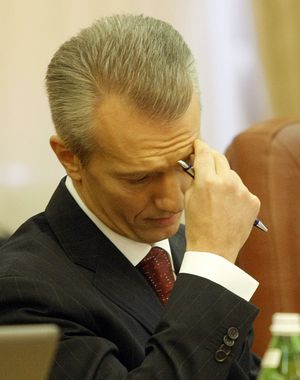Valerii KHOROSHKOVSKY: Reducing the number of inspectors is a question of political will

Another International Monetary Fund (IMF) mission has arrived in Ukraine. The Fund experts will reportedly stay in Kyiv until September 5 and discuss with the government such issues as the main macroeconomic targets of the 2013 state budget, energy sector reforms, and social security programs. Yet, according to The Day’s knowledgeable sources, this is not the full list. They claim the negotiators will also raise the question of revising the targets of this year’s budget because, in spite of the topmost leadership’s optimistic reports, the economic situation in this country does not seem to be inspiring confidence in foreign experts.
Each of the sides looked forward to this visit. Ukraine traditionally hopes to receive the Fund’s assurances to issue the next loan installment, and the IMF expects Ukraine to meet its commitments to improve the financial situation. To tell the truth, it is difficult to forecast that both sides will make concessions because one of the Fund’s main demands – to bring public utility rates into line with the economically sound level – still remains unfulfilled, while a revision of the gas contract with Russia (which could help to solve the rates problem) still remains very doubtful. In these conditions, against the backdrop of unfavorable reports from the world markets (reduced demand for this country’s main export-oriented products) and in the run-up to the parliamentary elections, a lot of questions arise about the Ukrainian financial system’s economic stability.
Will the hryvnia be able to bear this load? Is it planned to change the system of budgetary subsidies? When will the public utility rates be raised? In an exclusive interview with The Day, First Vice-Prime Minister of Ukraine, Valerii KHOROSHKOVSKY, focused on all these risk factors for the national economy and the ways to counter them. He was appointed the other day as Ukraine’s representative at the World Bank’s Board of Governors and as the Ukrainian government’s official in charge of coordinating the activities of ministries, local executive authorities, and local government bodies.
Mr. Khoroshkovsky was rather frank during the one-and-a-half-hour-long interview and did not dodge the questions that worry businesspeople today, such as attempts to stop offshore tax evasion and the possibility of establishing the financial police. Yet he asked us to delete some points from the final version of the text. Mr. Khoroshkovsky must have thought that he was quite open, but, frankly speaking, he was traditionally well-balanced and diplomatically cautious in all his statements.
You are in charge of Ukraine’s European integration. Do you think Ukraine would derive the main benefit from European integration in the economic or the sociopolitical field?
“I support the integration of Ukraine into Europe; moreover, I believe it will be successful. If I did not believe, I would not deal with this subject in the government. Accession to the EU is, first of all, about socio-cultural values and only then about the economy. So Ukraine’s European choice is the choice of a lifestyle.”
What do you expect from the visit of an IMF mission to Ukraine in early September?
“The main thing that we expect from the Fund mission’s visit is continuation of the dialogue on the next loan installment as part of the current program. We also know the items to be negotiated: macroeconomic targets for 2013, public utility rates, and a more flexible currency exchange rate. All these items have already been discussed before, so I suggested this time that we focus on the next year’s macroeconomic targets. The IMF will only continue to make standby loans available if it has a clear picture of the 2013 budget.”
(To be continued in the next issue)






